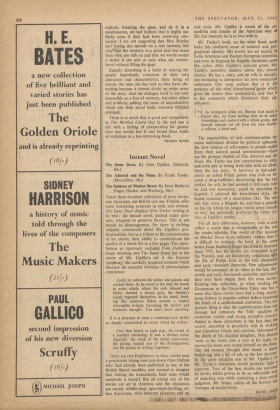Instant Novel
The Admiral and the Nuns. By Frank Tuohy. (Macmillan, 18s.) THESE three excellent collections of short stories, one American, one British and one Yiddish, offer some interesting contrasts in. style and content. The Same Door displays New Yorker writing at its best: the instant novel, packed under pres- sure, wrapped to preserve flavour. This is not meant as disparagement, for there is nothing vulgarly commercial about Mr. Updike's pro- fessionalism, but as a tribute to the concentration of his stories, their ability to communicate the quality of a whole life in a few pages. The cheer- fulness so rigorously excluded from Dubliners keeps breaking into The Same Door, but at the centre of Mr. Updike's art is the Joycean 'epiphany,' the carefully prepared moment which liberates the essential whatness of commonplace experience: Lastly he collected the dishes and glasses and washed them. As he stood at the sink, his hands in water which, where the suds thinned and broke, showed a silvery grey, the Sunday's events repeated themselves in his mind, bend- ing like nacreous flakes around a central infrangible irritant, becoming the perfect and luminous thought: You don't know anything.
It is a pleasure to read a contemporary writer so deeply committed to every word he writes: First they heard, at eight p.m., the sound of a tumbler shattering. It was a distinct noise, tripartite: the crack of the initial concussion, the plump, vegetal pop of the disintegration, and the gossip of settling fragments.
There are two Englishmen in these stories (one a precocious young man just down from Oxford who 'had already been published in one of the British liberal weeklies, and seemed to imagine that visiting the transatlantic land mass would constitute a scoop'). But all except one of the stories are set in America, and the characters are mainly middle-class, apartment-dwelling, ur-, ban Americans, with innocent pleasures and no real vices. Mr. Updike is aware of the ab- surdities and ironies of the American way of life, but basically he is in love with it.
Mr. Tuohy's book, on the other hand, quite lacks this confident sense of national and geo- graphical identity. His stories are set mainly in Latin American and Eastern European countries, and even in England his English characters seem like exiles. After Updike's intricate prose, Mr. Tuohy's narrative manner seems flat, almost clumsy. He has a story, and he tells it, straight, not hesitating to interpolate his own omniscient comments. One soon realises that it is the presence of this wise, disenchanted guide which gives the stories their authenticity, and that it is the comments which illuminate their sig- nificance: Ai As foreigners often do, Binsley had made a friend who, far from leading him on to other friendships and contact with a whole group, was himself already cut off from his own world: a solitary, a dead end.
tween individuals divided by political upheaval, the slow erosion of self-respect in people exiled The impossibility of real communication be' from their natural social environments—these are the primary themes of The Admiral and the Nuns. Mr. Tuohy has few consolations to offer, and even pity is wrung from him with an effort. Only the last story, 'A Survivor in Salvador, about an exiled Polish prince who fails to Ns' come a drug-trafficker, discovering that 'he had looked for evil, he had needed it, but each tine he had met innocence,' could be described as hopeful. I admired the bare-boned style, the brutal economy of a description like: 'He was tall, fair, wore a Brigade tie, and had a pust00 on his lip, which his tongue visited every mintde or two,' but personally preferred the richer tex- ture of Updike's stories.
For all their differences, however, both writers reflect a world that is recognisable as the one the reader inhabits. The world of The Spinoza of Market Street is so infinitely remote that it is difficult to evaluate the book in the same terms. Isaac Bashevis Singer has lived in America since 1935, but his stories are translated froal the Yiddish, and are exclusively concerned
the life of Polish Jews in the late nineteenth and early twentieth centuries. Few adjust-Haag would be necessary to set them in the late thir- teenth and early fourteenth centuries, and indeed they may have begun their life even earlier. Reading this collection, as when reading the Decanteron or the Canterbury Tales, one has a sense that these stories have had a long, anony- mous history in popular culture before receiving the finish of a sophisticated craftsman. The im- portant thing is that the sophistication does not, damage but enhances the 'folk' qualities of exuberant vitality and strong narrative interest. Added to these attractions is the fact that the society described is peculiarly rich in striking and expressive rituals and customs. Informed of the death of his married daughter, Neb Butlin' 'went to his room, tore a rent in his lapel, re- moved his boots and seated himself on the floor. The old woman brought him bread, a hard- boiled egg and a bit of ash, as the law decrees. In the same situation one of Mr. Updike's or Mr. Tuohy's characters would probably light a cigarette. Two of the best stories are narrated by devils, which proves to be an admirable waY of depicting vice while conveying a firm moral judgment. Mr. Singer enjoys all the literary ad-


































 Previous page
Previous page